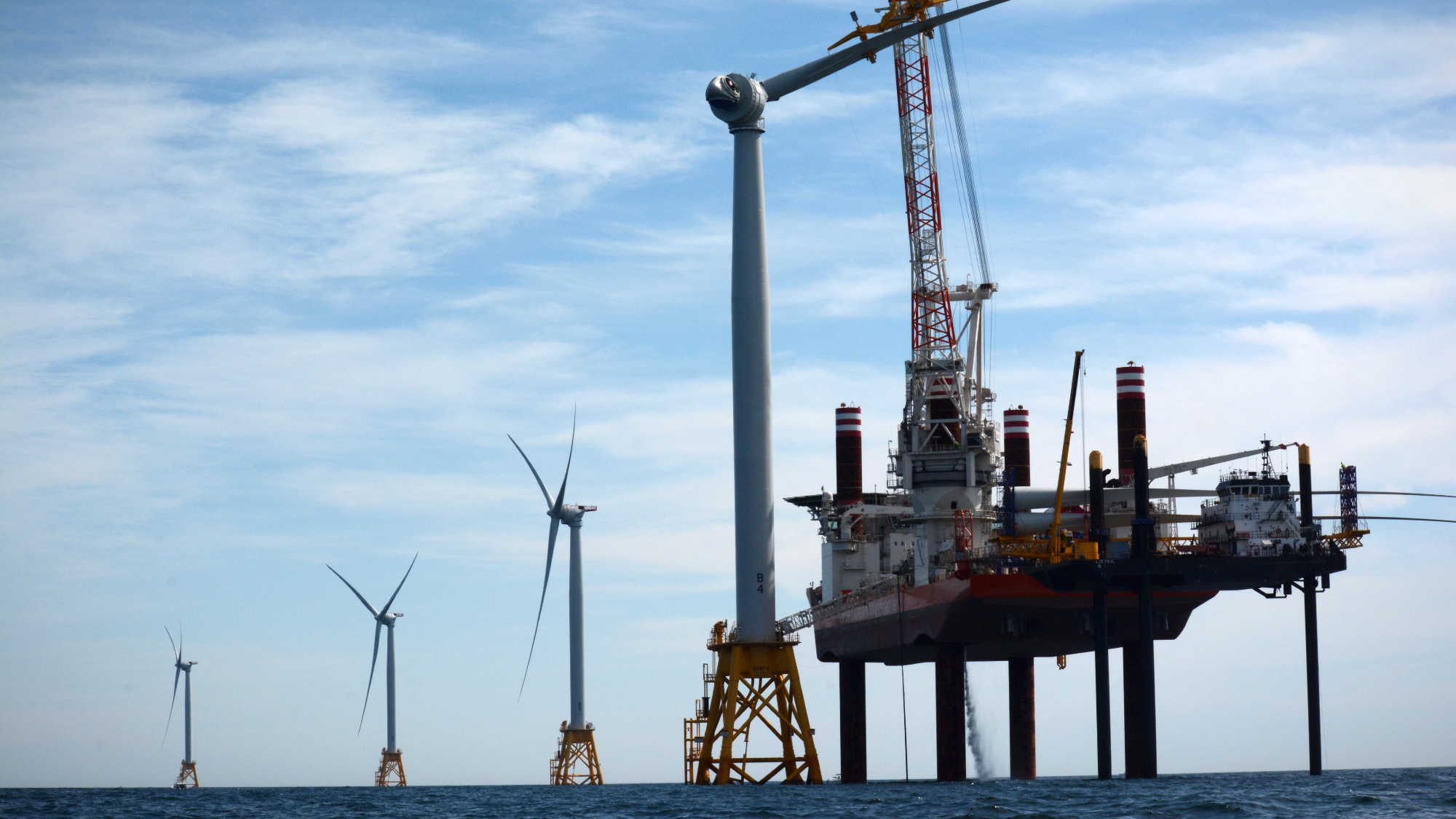Pros and cons of a windfall tax on oil and gas profits
Bumper results for energy companies have caught the chancellor’s eye

A free daily email with the biggest news stories of the day – and the best features from TheWeek.com
You are now subscribed
Your newsletter sign-up was successful
Rishi Sunak is planning to extend the windfall tax on energy companies’ profits as he looks to raise billions of pounds to plug the country’s fiscal hole.
Calls for the government to impose a further windfall tax on energy companies’ profits have reverberated around Whitehall after Shell reported “bumper profits” according to the BBC, reaching $9.5bn (£8.2bn) between July and September, up from $4.2bn during the same period last year.
Despite their prosperity, Shell received a tax rebate from the UK government this year for their North Sea business. In May, when Rishi Sunak was chancellor, he introduced the “energy profits levy” – a 65% tax on energy companies clawing back profits “they were not responsible for”, said Sky News. The previous top-tier tax rate was 40%.
The Week
Escape your echo chamber. Get the facts behind the news, plus analysis from multiple perspectives.

Sign up for The Week's Free Newsletters
From our morning news briefing to a weekly Good News Newsletter, get the best of The Week delivered directly to your inbox.
From our morning news briefing to a weekly Good News Newsletter, get the best of The Week delivered directly to your inbox.
But Shell ended up not paying any tax in Britain in the latest quarter, due to investment schemes which qualified them for a rebate. Shadow energy minister Ed Miliband responded to Shell’s results by calling for a “proper windfall tax” in place of the “ludicrous tax breaks” that the company has benefited from.
Chancellor Jeremy Hunt is now “considering raising the 25% rate as well as extending the levy beyond its 2025 expiry date”, according to The Times, as well as “broadening it beyond oil and gas companies to electricity firms”. The Telegraph said a meeting between the prime minister and Hunt resulted in agreement that “there was still a ‘massive fiscal black hole to fill’ and billions in headroom was needed”.
The current windfall levy is expected to raise £17bn before the end of 2023, which will go some way towards balancing the books. But such taxes remain controversial.
1. Pro: helping households with bills
Labour argued for a 10% increase in corporation tax, a tax paid on profits, for North Sea oil and gas producers in the year beginning in April. The ultimate increase ended up being 25%, far higher than Labour originally called for, reflecting the dire situation of the government’s finances.
A free daily email with the biggest news stories of the day – and the best features from TheWeek.com
According to The Guardian, Labour called for the money raised to go towards helping households struggling with rising energy prices. The government has made a similar pledge by introducing the energy price guarantee, although it is only in place for six months.
A further windfall tax has the backing of other major parties, with the Liberal Democrats arguing that energy companies should “pay a little more to help the most vulnerable”, and the SNP and Green Party also supporting such a tax, said the BBC.
Such a proposal has been mooted by Labour for some time. In its 2019 manifesto the party argued that a windfall levy could raise up to £11bn, to help the UK “transition towards a green economy”, said Sky News.
2. Con: fears surrounding investment
In May, when he was prime minister, Boris Johnson originally pushed back on a windfall tax, telling Good Morning Britain earlier this month that a levy on energy companies could “discourage them from making the investments that we want to see that in the end will keep energy prices lower for everybody”.
Sunak responded in an interview with the BBC by saying, “What I want to see is a significant investment back into the UK economy to support jobs, to support energy security, and I want to see that investment soon,” he told the broadcaster. “And if that doesn’t happen, then no options are off the table.” Subsequently, the now-prime minister introduced the energy profit’s levy which The Times have reported, has “not deterred investment as critics had feared”.
For many, the positive result of the levy is no surprise. When asked by The Times in May if any of BP’s planned investments would not go ahead if a windfall tax were introduced, chief executive Bernard Looney said: “There are none that we wouldn’t do.”
3. Pro: already a historical precedent
This is not the first time the UK government has taken such action against British industry.
In 1981, Conservative chancellor Geoffrey Howe levied the banks after arguing that they had benefited from high interest rates. And in 1997, Labour chancellor Gordon Brown raised £5.2bn over two years from a windfall tax on privatised utilities to pay for his “welfare to work” programme.
4. Con: the impact on private pensions
Critics of a windfall tax have said that older people could suffer disproportionately, as many pension funds “benefit from the profits of big oil companies”, explained the BBC. As some private pension funds own shares in energy companies, they benefit from profits through dividends.
But this argument has been disputed by progressive think tank Common Wealth, whose director told The Guardian that the pensions argument was a “dangerous red herring”.
He said that while it’s true that some BP dividends do make their way down to “ordinary pensioners”, this isn’t how the majority of UK pensions operate any more. “In reality, only 8% of BP and Shell’s shares are owned by the UK pension fund,” said the paper.
5. Pro: big firms can take the hit
“The little secret about the Labour party’s version of windfall tax is that it is very modest,” wrote Nils Pratley, The Guardian’s financial editor, back in May. An increase from 40% to 50% in the tax rate on North Sea oil and gas profits would, for example, turn BP’s expected “£1bn tax bill for the relevant assets this year into one of £1.25bn”. Following such logic, the eventual rise to 65% puts BP’s tax liability at £1.63bn.
This extra tax bill “would not explode BP’s precious ‘long-term financial framework’”, argued Pratley, which has already endured a massive divestment from Russian state oil company Rosneft, and is still planning to pay investors £4bn in dividends this year, “with possibly the same again via share buybacks”.
Oil and gas companies might argue that such a windfall tax is unfair. “No one’s proposing a one-off windfall subsidy when they make a loss… it might discourage investment if energy companies think that if all goes well they’ll get a heavy tax, whereas if it goes badly, they won’t get cushioned,” argued the Institute for Fiscal Studies’ Stuart Adam to The Guardian.
But the paper points out that the UK is already “one of most generous fiscal regimes for oil and gas producers”. Analysis of OECD data by campaign group Paid to Pollute shows that between 2016 and 2020 oil and gas companies received £13.6bn in subsidies, reported The Independent.
6. Con: not enough to solve the crisis
While the existing levy could raise as much as £17bn by the end of 2025, when it currently ends, “the Government would have to find around £35bn of spending cuts or tax rises to appease the markets”, said The Telegraph, meaning the windfall tax won’t solve the crisis on its own.
Recent calls for the levy to be increased and extended result from a sense that the current scheme is too little too late, with the Liberal Democrat leader Sir Ed Davey describing it as “an insult to struggling families”.
Even the CEO of Shell has called on the government to “further tax energy companies to ‘protect the poorest’ in society”. CEO Ben van Beurden “conceded there was a case for windfall taxes”, said The Telegraph, provided they were “designed in a ‘correct and appropriate’ way”.
-
 Switzerland could vote to cap its population
Switzerland could vote to cap its populationUnder the Radar Swiss People’s Party proposes referendum on radical anti-immigration measure to limit residents to 10 million
-
 Political cartoons for February 15
Political cartoons for February 15Cartoons Sunday's political cartoons include political ventriloquism, Europe in the middle, and more
-
 The broken water companies failing England and Wales
The broken water companies failing England and WalesExplainer With rising bills, deteriorating river health and a lack of investment, regulators face an uphill battle to stabilise the industry
-
 How corrupt is the UK?
How corrupt is the UK?The Explainer Decline in standards ‘risks becoming a defining feature of our political culture’ as Britain falls to lowest ever score on global index
-
 The high street: Britain’s next political battleground?
The high street: Britain’s next political battleground?In the Spotlight Mass closure of shops and influx of organised crime are fuelling voter anger, and offer an opening for Reform UK
-
 Why is Trump killing off clean energy?
Why is Trump killing off clean energy?Today's Big Question The president halts offshore wind farm construction
-
 Trump halts wind power projects, citing ‘security’
Trump halts wind power projects, citing ‘security’Speed Read
-
 Is a Reform-Tory pact becoming more likely?
Is a Reform-Tory pact becoming more likely?Today’s Big Question Nigel Farage’s party is ahead in the polls but still falls well short of a Commons majority, while Conservatives are still losing MPs to Reform
-
 Asylum hotels: everything you need to know
Asylum hotels: everything you need to knowThe Explainer Using hotels to house asylum seekers has proved extremely unpopular. Why, and what can the government do about it?
-
 Taking the low road: why the SNP is still standing strong
Taking the low road: why the SNP is still standing strongTalking Point Party is on track for a fifth consecutive victory in May’s Holyrood election, despite controversies and plummeting support
-
 Behind the ‘Boriswave’: Farage plans to scrap indefinite leave to remain
Behind the ‘Boriswave’: Farage plans to scrap indefinite leave to remainThe Explainer The problem of the post-Brexit immigration surge – and Reform’s radical solution